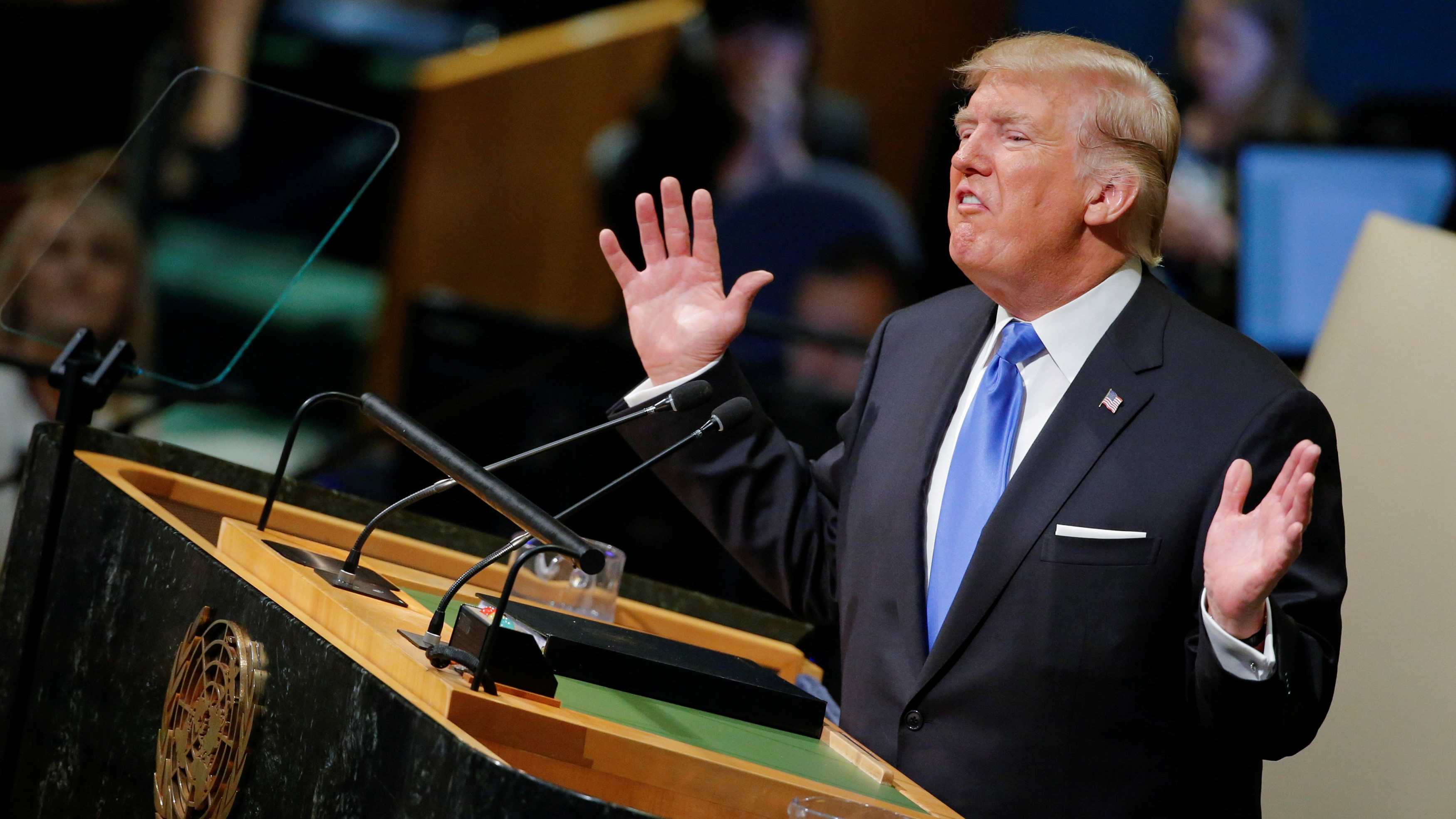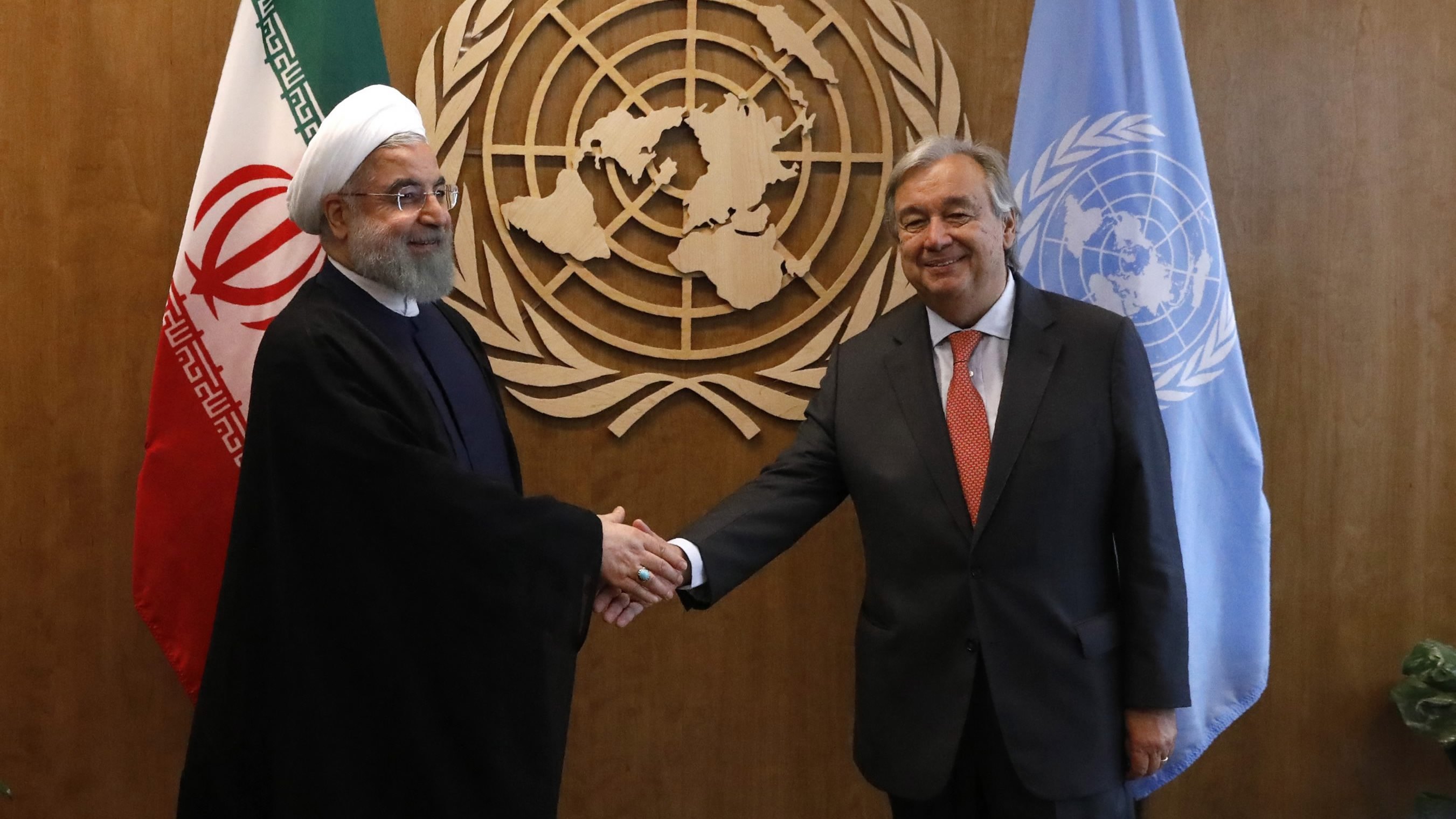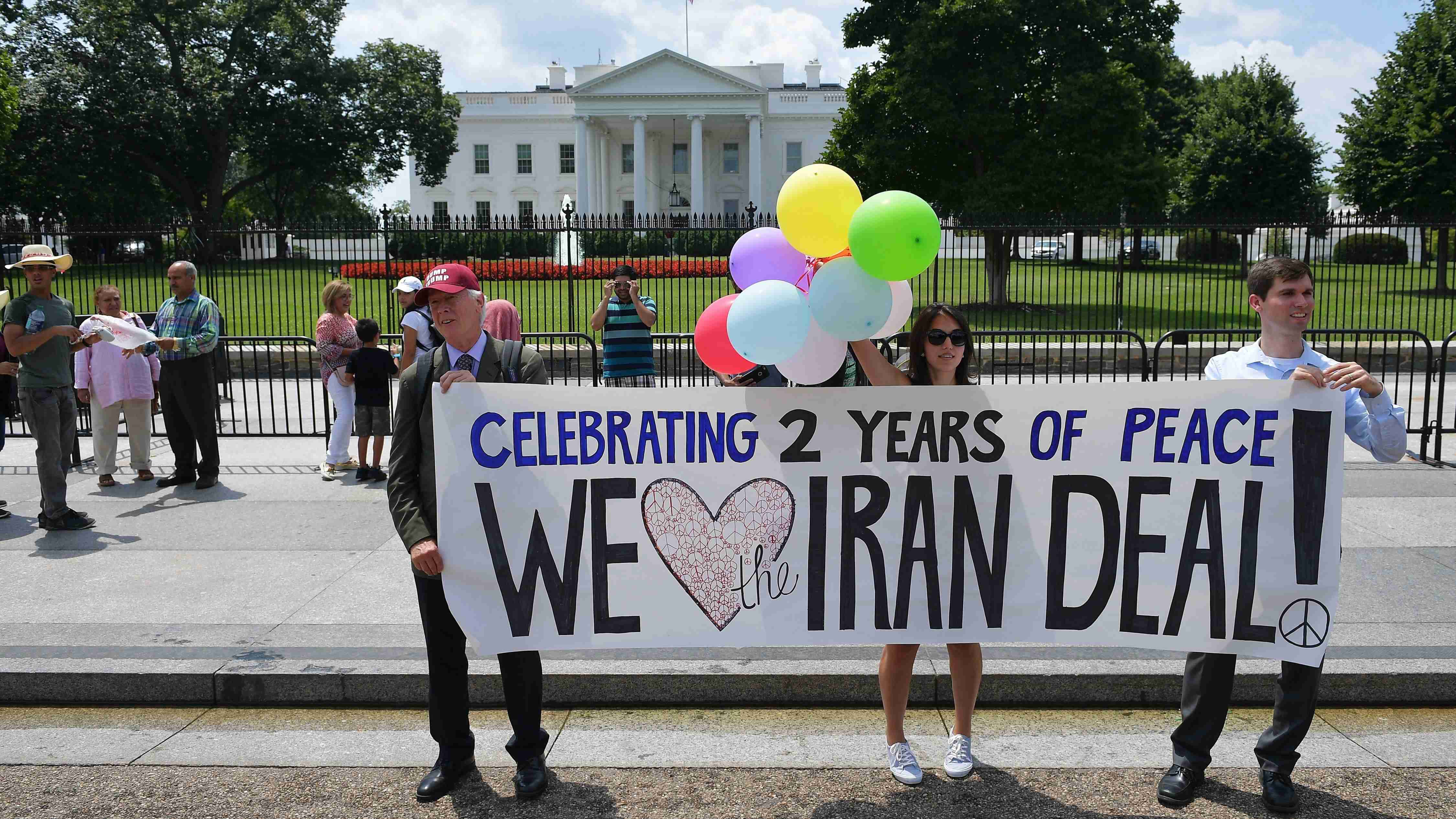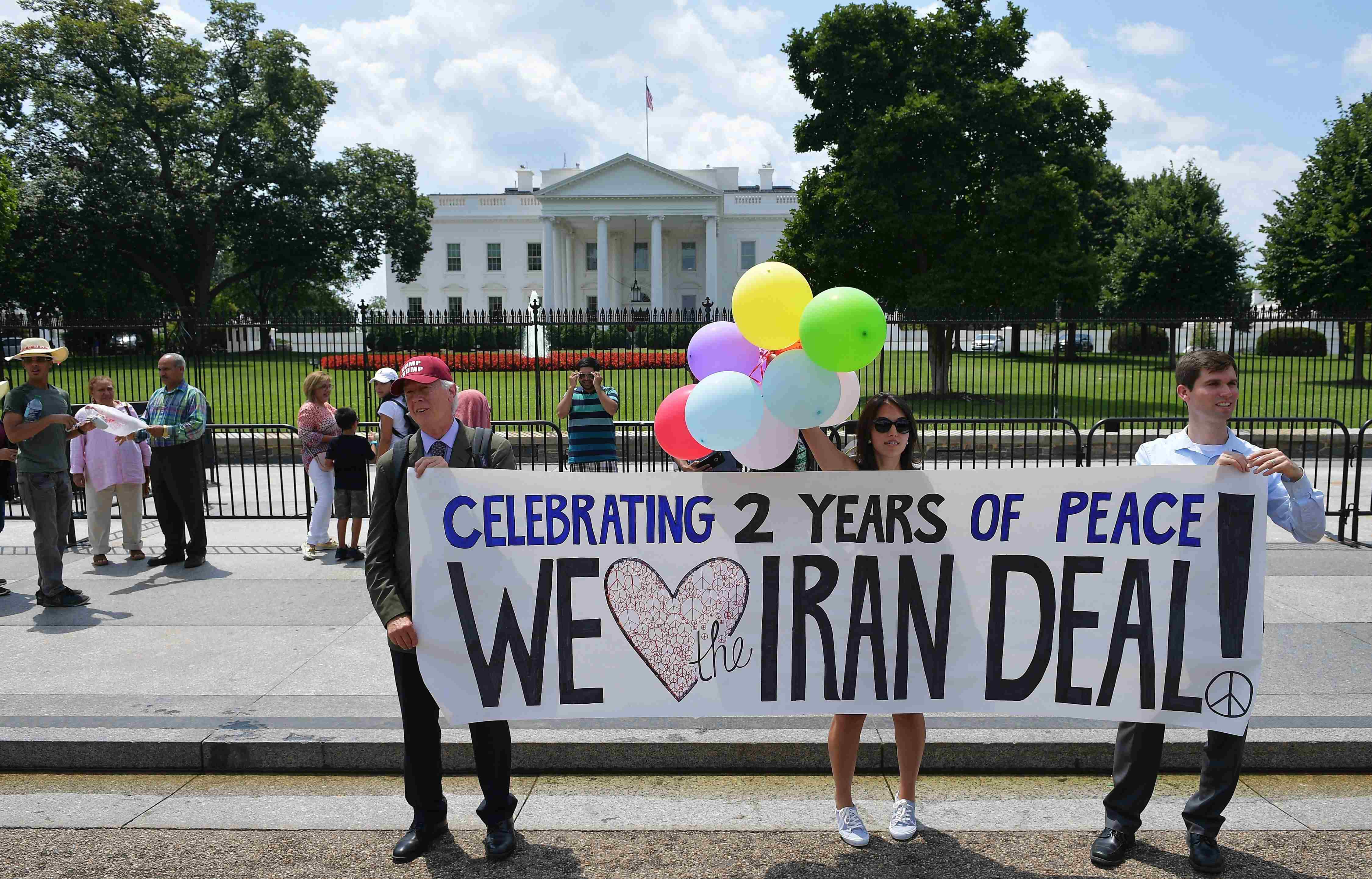There’s a big question mark looming over the Iranian nuclear deal which was struck between Tehran and the P5+1 group of world powers – the US, the UK, France, China, Russia and Germany – in 2015, following US President Donald Trump’s latest assertions on Tuesday.
The deal led to the US and Europe lifting some sanctions from Iran after Tehran agreed to surrender most of its enriched uranium and open its nuclear sites to UN inspection.
Delivering a speech at the United Nations, Trump called the Iran nuclear deal “an embarrassment” and said he may withdraw from the accord while blasting Tehran for spreading violence in the Middle East.

US President Donald Trump addresses the 72nd United Nations General Assembly at UN headquarters in New York, US, September 19, 2017. /Reuters Photo
US President Donald Trump addresses the 72nd United Nations General Assembly at UN headquarters in New York, US, September 19, 2017. /Reuters Photo
US law requires the president to certify every 90 days that Iran is in compliance with the pact and Trump has signaled he will either not do this when the next deadline comes around in mid-October or will pass the decision to Congress where criticism of Iran is high.
Iran, as expected, has hit out against the US move with Foreign Minister Mohammad Javad Zarif slamming Trump's address as an "ignorant hate speech" and President Hassan Rouhani warning that the US would forfeit the trust of the international community if it abandons the nuclear accord.
Other powers want to save the deal

French President Emmanuel Macron speaks during a press conference on the sidelines of the 72nd United Nations General Assembly at UN Headquarters in New York, US, September 19, 2017. /Reuters Photo
French President Emmanuel Macron speaks during a press conference on the sidelines of the 72nd United Nations General Assembly at UN Headquarters in New York, US, September 19, 2017. /Reuters Photo
Other world powers, including America’s European allies, are desperate to save the deal as they continue to see it as the most effective way to prevent Iran from building a bomb.
France has led global efforts to convince Trump not to abandon the deal. President Emmanuel Macron stood firm on Tuesday, saying that the 2015 deal was a "solid, robust agreement that verifies that Iran will not build a nuclear weapon."
"To reject it now without proposing anything else would be a grave error, and not respecting it would be irresponsible," he told the assembly.
British Prime Minister Theresa May has called the accord “vitally important,” while German Chancellor Angela Merkel has already questioned the reliability of the US and urged that Europe “really must take our fate into our own hands.”
Russia, too, has urged Washington to stick with the deal.
Implications of a US withdrawal

Iranian President Hassan Rouhani (L) shakes hands with United Nations Secretary General Antonio Guterres prior to their meeting at UN headquarters in New York, US, September 18, 2017. /Reuters Photo
Iranian President Hassan Rouhani (L) shakes hands with United Nations Secretary General Antonio Guterres prior to their meeting at UN headquarters in New York, US, September 18, 2017. /Reuters Photo
Under the nuclear deal, Iran surrendered much of its enriched uranium, dismantled a reactor and submitted nuclear sites to UN inspection, while Washington and Europe lifted some sanctions.
The deal is not a bilateral agreement between Washington and Tehran, but a multilateral one between seven governments, many of who do not share Trump’s sentiments. No one expects the Europeans to re-impose sanctions on Iran, even if the US chooses to impose its own.
If the US withdraws from the deal, Iran could be tempted to return to its past levels of uranium enrichment, or even increase them as it has threatened to do.
Last month, Rouhani warned that Iran's nuclear program could be restarted in a matter of hours, if the US imposes more sanctions on Tehran.
He asserted that the reconstituted nuclear program would be "far more advanced," a veiled threat that the country could start enriching uranium up to the level of 20 percent, a step toward building a nuclear weapon.

Activist take part in a rally to commemorate the nuclear deal with Iran in front of the White House, in Washington, DC on July 14, 2017. /AFP Photo
Activist take part in a rally to commemorate the nuclear deal with Iran in front of the White House, in Washington, DC on July 14, 2017. /AFP Photo
The US withdrawal may also lead to a deepening of rifts within the NATO alliance.
“Given the downturn in US-European relations on issues such as NATO policy and the Paris climate accord, the Iran nuclear deal is becoming an important parameter for Europeans on the issue of safeguarding international norms,” said Ellie Geranmayeh, senior policy fellow for the Middle East and North Africa program at the European Council on Foreign Relations.
“In Washington, there is a lot of talk about co-opting or forcing Europeans to take the same position as the US. This is not just about Iran policy. It is also about the idea of protecting international norms, international institutions, and the capacity of multilateral diplomacy to deliver,” she added.
Trump’s decision may have repercussions on US-Russia ties too. While the US president has vowed to improve bilateral relations and engage with Russia in the common fight against ISIL, his scrapping the nuclear deal might just have the opposite effect.
US withdrawal from the deal could also upset the current balance of power between the major players in the Middle East, with unforeseen consequences.
And finally, under the deal, limits on Iran's uranium enrichment will begin to expire in 2025 as per the "sunset clauses", which means the US and the other powers will soon need to devise a strategy to prevent Tehran from pursuing a larger enrichment capacity.
To do so, the US will need to work together with Britain, China, France, Germany, and Russia once again. Alienating the leadership of these countries now will make such a task much harder to achieve.
China's credit line

Iranian officials applaud on the platform as the first train connecting China and Iran arrives at Tehran Railway Station on February 15, 2016. /AFP Photo
Iranian officials applaud on the platform as the first train connecting China and Iran arrives at Tehran Railway Station on February 15, 2016. /AFP Photo
A Chinese state-owned investment firm inked a deal to provide a 10 billion US dollar credit line for Iranian banks, the Iran Daily reported on Saturday quoting the central bank's president.
The credit line will use euros and yuan to help bypass US sanctions that have continued despite the nuclear deal.
The contract was signed in Beijing between China's CITIC investment group and a delegation of Iranian banks led by central bank president Valiollah Seif.
The new credit line will go to Iran's Refah Kargaran, San'at va Ma'dan, Parsian, Pasargad and Tose'e Saderat banks and would finance water, energy and transport projects, the report said.
China is already Iran's biggest oil customer and accounts for a third of its overall trade.
Since lifting sanctions, Beijing has opened two credit lines worth 4.2 billion US dollars to build high-speed railway lines linking Tehran with Mashhad and Isfahan, the Iran Daily reported.
It is evident that even if the US withdraws from the Iran deal, Russia and China – both permanent members of the UN Security Council – are expected to pursue their respective interests and block any attempts to reinstate sanctions.
In such a scenario, Trump's move is unlikely to have any real effect on Iran but could damage collaborative approaches to limiting their nuclear program.
(With input from agencies)







